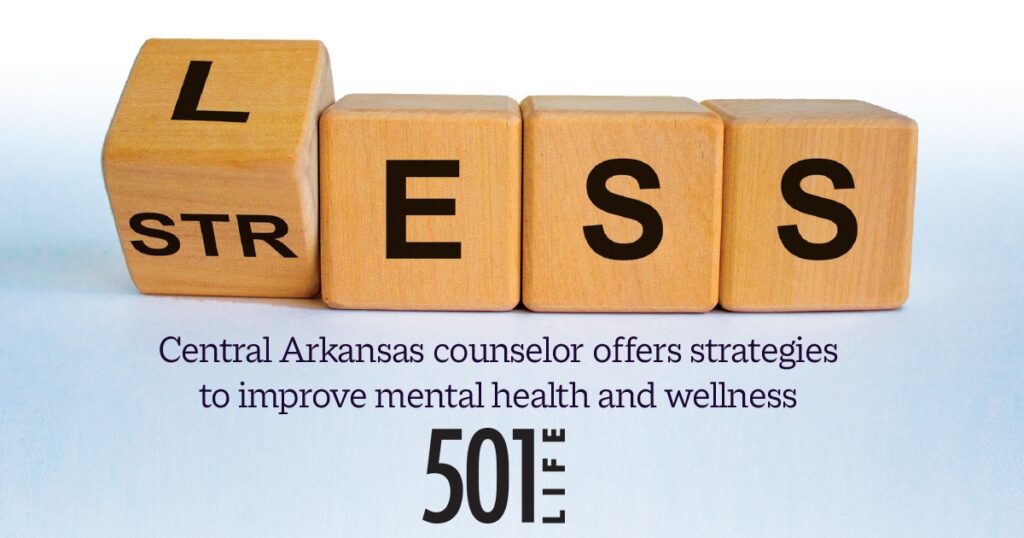29 Sep 2024 Central Arkansas counselor offers strategies to improve mental health and wellness
By Tresvil G. Pack, Ph.D., CRC, LPC-S, BC-TMH, ASDCS
Stress, much like anxiety, is a normal part of our lives. It is a feeling of strain or pressure we feel about some aspect of life, or many times about most aspects of life. Small amounts of stress can improve athletic, academic, or work performance, improve motivation and enhance our reaction to the environment. Large amounts of stress, however, are detrimental to our mental and physical health.

The best way to decrease stress is to have a healthy lifestyle that prevents the normal stress of life from overcoming our typical coping techniques. A healthy lifestyle includes plenty of water to keep our bodies hydrated, good quality food to keep our energy levels up, moderate exercise that includes both cardio and resistance training and about eight hours of sleep each night.
There are times when we can do all the right things to keep our bodies in good working order but still be overwhelmed by too much stress. When this occurs, we may experience some of the following symptoms: exhaustion, headaches, dizziness, shaking, high blood pressure, digestive problems, chest pain, muscle tension, body aches and pains, and a weakened immune system. Since I don’t know anyone who wants to experience those symptoms, we need to know what to do to decrease the stress we are experiencing. There are several strategies we can employ to help with stress reduction.
Use relaxation techniques:
• Prayer – If you believe in a higher power, turning the things that you can’t control over to that power can relieve you from the expectation that you will do something about those things.
• Meditation – Focus on one peaceful thing for an extended period of time can relieve the pressure for a while and let the body relax.
• Tai Chi – Incorporates low-impact exercise, flowing movements, deep breathing, and a meditative state.
• Breathing Exercises – These are probably the most known and taught method to calm a person. Used regularly, they can help maintain a lower stress level. They work by oxygenating the body and helping us focus on breathing instead of on what we are stressing about.
• Muscle Relaxation – When we carry excess stress our muscles tighten, and many of them do not go back to a relaxed position. Intentional focus on muscle groups and alternating flexion and relaxation will let us know where we are holding tension in our bodies and give us an opportunity to relax.
Practice Gratitude:
• Make a list of all the things to be thankful for in your life and read over the list every morning.
• Pay attention to the positive things that happen each day and focus on them.
• Pay attention to the people in your life and give thanks to those who are positive and helpful.
Be Nice to Yourself:
• Instead of allowing your focus to be on what you did wrong, focus on what you did right.
• Give yourself regular breaks throughout the day and do something for yourself during those breaks. Don’t skip lunch, and don’t work through your breaks.
• When you have worked the time allocated for work (typically 8 hours), stop and do something fun.
Eliminate Some Sources of Stress:
• Eliminate hurry – Hurry almost always adds stress because we don’t think well when we hurry, and we forget things, and that creates more stress. Adequate planning relieves hurry.
• Eliminate negative people – I know that there are some negative people in our lives that we either can’t or don’t want to eliminate, so reduce the interaction you have with those people until your stress level is low enough to tolerate more time with them.
Seek Counseling
Counseling can help identify the sources of stress in your life and make a plan to address those stressors. When we look at our own lives, we often miss some of the sources of stress or have no idea how to address those stressors. An objective view of your situation may result in clarity. Often, that level of clarity will allow you to address the stress (you know exactly what to do when you see the issue clearly), and other times, you can work with your counselor to develop and enact a plan to reduce stress. We have several counselors at Restored Life Counseling who can help you identify and plan to reduce your stress level.









